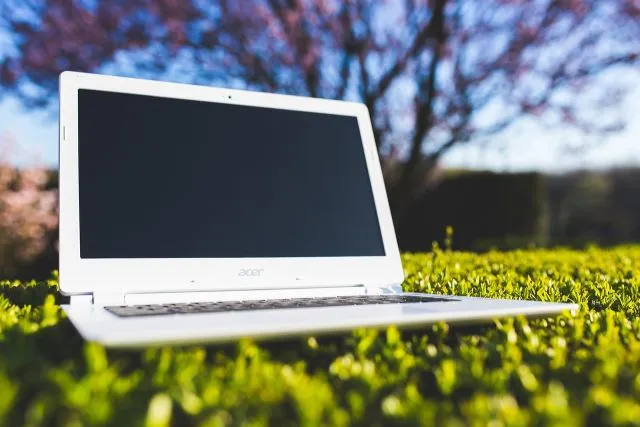Twin Transition – Digitalisation and Sustainability
The original article was published in German by Gabriele Müller.
Sustainability is much more than just a buzzword. With the increasingly tangible impacts of climate change and growing awareness that resources are finite, the issue is becoming more urgent. People, businesses, and organisations are noticing this—and many are taking action. At the same time, another “mega-topic” already shapes everyday life: digitalisation has become omnipresent. It is transforming work, communication, and life in many areas. Both topics are also beginning to significantly influence adult education. But how are they connected? What does the term “twin transition” really mean?

“Both digitalisation and sustainability are currently putting a certain pressure on businesses and society,” says Jan Quaing, research associate at the German Federal Environmental Foundation (DBU) in Osnabrück. “Both are absolutely relevant issues for all of us, both are complex, and there are systemic interconnections.” In other words: one cannot be considered without the other. According to studies, the targeted and accelerated use of digital solutions could be crucial in the fight against climate change, as energy efficiency, climate protection, and decarbonisation are inextricably linked to digitalisation.
Only successful together – that’s how twin transition works
There are synergies in many other areas—for example, intelligent systems can track the environmental impact of supply chains, video conferencing can eliminate the need for travel, and paperless offices can be advanced. Continuing education has also changed massively in recent years, as digitalisation has made educational processes more efficient, flexible, and resource-friendly. Furthermore, knowledge about sustainable topics like environmental protection and resource-efficient behaviour can now be spread more easily and widely.
“A linkage between sustainability and digitalisation creates new opportunities for business activities and fields of work,” the DBU sustainably.digital Monitor 2022 states—a study on the twin transition authored by Jan Quaing. “This opportunity for more sustainable business practices can also enhance companies’ resilience—especially crucial in times of resource scarcity and strained global supply chains.”
However, interactions must always be understood systemically, as dependencies are numerous. Data usage, hardware and software production, and artificial intelligence all consume vast amounts of energy and deplete finite resources. Quaing points to rare earth elements, which are essential for manufacturing semiconductors, smartphones, and electric vehicles. “Here, too, is a direct link to sustainability,” he says. “It’s about how sustainable processes can, for example, reduce emissions from data centres.”
Jan Quaing is optimistic about the future: “There are many innovative companies and examples already showing how the future can work. But we must not rest—we have to continue what gained momentum during the pandemic.”
There are already lighthouse projects and new business models, such as those in the sharing economy. “We need to build more know-how and communicate the know-why,” says Quaing. This means understanding not just the “how,” but also why taking action is important. “Companies, organisations, NGOs—many are interested in a dual strategy and are looking for ways to implement it. That’s where we, the German Federal Environmental Foundation, see ourselves as bridge-builders. We aim to showcase paths forward, offer positive future visions, and support innovative ideas.”
Many EU measures—such as the Corporate Sustainability Due Diligence Directive (CSDDD)—still need to be translated into German law. “This means a market shift is coming, and investments in sustainability and digitalisation will pay off,” says Quaing. “We want to encourage stakeholders to engage with the twin transition and seize the opportunities it presents. We offer information, starting support, and showcase best practices.”
“We need to get started—the clock is ticking.”
On the DBU’s competence platform nachhaltig.digital, there are “building blocks” designed to help businesses easily enter the topic. These provide facts and insights into future market potential, good practices, and networking opportunities. Topics include “Corporate Digital Responsibility,” “circular economy,” and “smart grids.” New topics are added quarterly, complemented by events and online sessions with experts. One of the building blocks also addresses “digital education for sustainable development.”

There are good examples where digitalisation and sustainability go hand in hand in the field of education. “If I had to highlight one from many examples, I’d choose the ‘transformation guides’ from the Educational Institute of the Lower Saxony Economy,” says Jan Quaing. This virtual qualification programme is aimed at people in supervisory or technical roles, or those involved in quality management. “The digital transformation requires significant skill upgrades among employees. To prepare workforces for upcoming changes, specialists in digital transformation and change management are in high demand as knowledge multipliers.”
Participants acquire the skills needed to support their colleagues through company transitions effectively and with acceptance. They learn to identify innovation potential and detect problems in change and learning processes at an early stage.
However, integrating digitalisation and sustainability into education does not always require formal training. One everyday example is Ackerpause (“field break”), based on concepts developed by the nonprofit Acker e.V. This project not only creates initiatives for children and schools but also targets companies, neighbourhoods, and care facilities. The aim is to bring vegetables from field to plate—“gardening in, around, or on the office” is the motto. The goal is for both plants and team spirit to grow. A team starts a vegetable garden together using the Ackerpause app, which guides them through all necessary steps and provides background knowledge. Seminars and team events—including shared meals with homegrown produce—round out the experience.
These examples demonstrate, on a small scale, how transformation can succeed on a larger one. “They not only show the close links between sustainability and digitalisation—they also offer positive future visions we need to drive development forward.”
Further information
www.dbu.de
https://nachhaltig.digital
Kontakt (https://www.linkedin.com/in/jan-quaing-46b8bb192/)
Book Recommendation::
Doppelte Transformation gestalten: Ein Praxisleitfaden zu Nachhaltigkeit und Digitalisierung
Jan Quaing, Julia Fink, Beatriz Bilfinger, Jan Vorländer
ISBN: 978-3-96238-129-5Softcover, 220 pages
Free PDF download available
Image Credits:
Jan Quaing: DBU
Alle anderen: Pixabay




